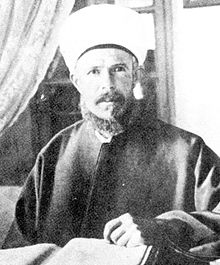You can help expand this article with text translated from the corresponding article in Hebrew. (April 2024) Click [show] for important translation instructions.
|
Kamil al-Husayni | |
|---|---|
كامل الحسيني | |
 | |
| Personal | |
| Born | Kamel ibn Mohammad Taher ibn Mostafa Taher ibn al-Husayni 23 February 1867 |
| Died | 31 March 1921 (aged 54) |
| Resting place | Jerusalem |
| Religion | Islam |
| Denomination | Sunni |
| School | Sufism |
| Jurisprudence | Hanafi |
| Creed | Maturidi |
| Profession | Mufti |
| Muslim leader | |
| Predecessor | Mohammed Tahir al-Husayni |
| Successor | Amin al-Husayni |
| Profession | Mufti |
Kamil al-Husayni (also spelled Kamel al-Hussaini; Arabic: كامل الحسيني; 23 February 1867 – 31 March 1921) was a Sunni Muslim religious leader in Palestine and member of the al-Husayni family.[citation needed] He was the Hanafi Mufti of Jerusalem from 1908, and in 1918 the British Mandate authorities appointed him as the first “Grand Mufti of Jerusalem“, a title they had copied from the Grand Mufti of Egypt.[1] The British referred to him as “the representative of Islam in Palestine and a member of the oldest nobility of the country”.[2][non-primary source needed]
Al-Husayni was the son of Mohammed Tahir al-Husayni, who had preceded him as Hanafi Mufti of Jerusalem.
Politically, his approach was very different from his father’s. During the British Mandate for Palestine, he sought compromise with the Jews and British authorities.[3] The British appointed him chairman of the Appeal Courts and later director of the Higher Waqf Committee.[3] The British also made him a Companion of the Order of St Michael and St George (CMG).[3]
He was succeeded by his half-brother Mohammad Amin al-Husayni.
- ^ Porath, 1971, pages 125–128
- ^ Palin Report, article 13
- ^ a b c Porath 1971, p. 128: “These developments were hastened by another important factor, this time of a more personal nature. When the British entered the city the Mufti of Jerusalem happened to be Kamil al-Husayni. From the outset, Kamil al-Husayni went out of his way to be of aid to the British, particularly when it came to working out a suitable arrangement between the authorities of the occupation and the local population, and he made it very much easier for the latter to get used to the idea of a Christian power ruling in Jerusalem. He saw to it that the question of naming the Muslim ruler during Friday prayers did not develop into a political issue, and even his attitude to the Jews and his relations with them were friendly and correct. During the period of tension that followed the April 1920 disturbances, he appealed to the public in the course of a sermon at the al-Aqsa mosque to maintain law and order and to rest assured that the British Government, as was their policy everywhere, would do nothing to hinder the Muslims in the practice of their religion. The British authorities, first military and then civil, were indebted to Kamil al-Husayni for his exemplary conduct. One of the ways in which their esteem for him found expression was the award made to him of the C.M.G.”